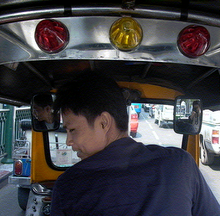Wang Lee community has been living in Chareon Krong 52 Lane by the Chao Phraya River in Bangkok. Renting out shop houses on a land that belongs to Wat Yannava for the past 80 to more than 100 years, they are currently under threat of eviction from this temple landlord.
Two years ago, the temple decided not to extend their leases, and instead offered the land out to gain much better profit from a developer. 40,000 Baht (US$1,100) was offered as compensation for a family and approximately half of the community accepted the offer and moved out. But the rest want to stay, for the reasons that they have no where else to go, and they have formed an interlinked of families that make up a living history of Bangkok.
Most of Wang Lee community members are descendants of Chinese immigrants in Bangkok, some still have three and few even four generations living under the same roof. Their shop houses are living proofs of historical trading between China and Thailand. Although the buildings do not fall under historical conservation of Bangkok, they are nevertheless constructed ingeniously for the local climate. The shop houses are designed to be naturally ventilated, crossing the opening on the first-floor of the shop front to a double- or a triple- floor height ceiling with manually-operable roofs for ventilation.
Nevertheless, these facts do not seem to matter for the temple landlord. For the past two years, the chief monk at the temple has not agreed to meet directly with the people, making them start a series of negotiations with various government agencies, and a social activism supported and facilitated by NGOs and university lecturers. The community has lost in a court battle against the temple, and although the community has applied to appeal the case, the temple landlord has set up a January 4, 2007 deadline for all tenants to move out.
Hoping that the appeal to the court will delay the deadline, the community did not expect some twenty construction workers to come early in the morning, on the long New Year Day weekend, before the deadline is actually due.

As I arrived at the area, some fourteen empty shop-houses were already partially demolished.
Anxious citizens, shouting, talking, standing, staring
Fingers typing and phones ringing, informing, repeating, urging
East to West pacing, policemen standing, sitting, idling
Displaced doors and windows, knocking, banging, moving
Wooden stacks and piles on concrete pavements, waiting
Knocked-down walls of hundred years, grieving
After knocking down security measures and making signifying holes in the shop houses, the construction workers abruptly left the premises. The act of terrorizing has been achieved. Nevertheless, the community has not given up their hopes in keeping their living history, thanks to political, governmental, social, civil, and academic supports they have received. Click here for Bangkok Post's version of the story.
As Saddam’s execution made the day’s world [hi-]story (history and/or hi-story), what to make of the living [hi]story (history and/or story) of Iraqis people? How much would his death really matter in the making of current and future suffering and/or happiness of most Iraqis people and others affected by Saddam’s life? As parts of Wang Lee’s shop houses became history, what to make of the living [hi]story of this historical community in Bangkok? They may or may not succeed in keeping their homes, yet what has been gained, or lost, during the process of taking down parts of the history?
What if the hi-story of major relevance to few (media and political, or private enterprise in this case) is replaced by the [hi]story of everyday people? Perhaps only then could everyone look forward to the New Year.



